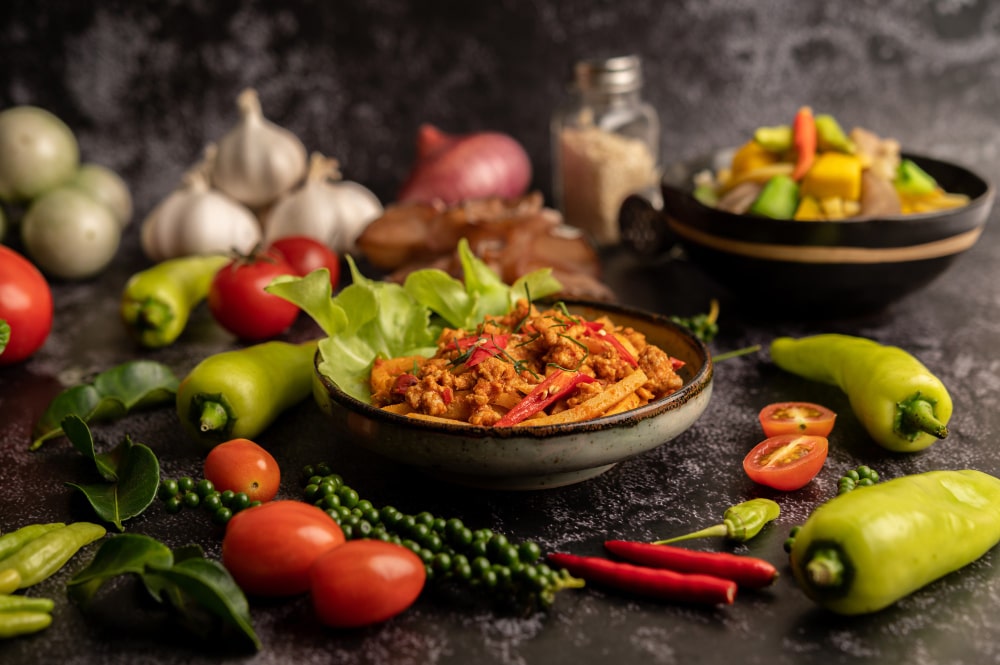Spicy food is a common craving for many pregnant women. But since the safety of consuming spicy food during pregnancy hasn’t been thoroughly studied, it’s important to understand the potential risks and benefits of eating spicy food while expecting. Read on to learn about the pros and cons of consuming spicy food while pregnant and some tasty recipes you can try if you’re craving something spicy.
Potential Benefits of Eating Spicy Food while Pregnant
Eating spicy foods may have some health benefits for pregnant women, including:
Relieving Nasal Congestion
Spicy foods can help reduce the symptoms of nasal congestion and colds by clearing the sinuses and aiding in mucus drainage. This can be especially helpful for pregnant women, as pregnancy hormones can cause congestion and other cold-like symptoms.
Boosting Metabolism
Spicy foods can help boost Metabolism, which can benefit pregnant women since their bodies are going through so many changes, and the baby is using some of the mother’s energy resources. A higher metabolic rate can also help reduce weight gain during pregnancy.
Improving Mood
Spicy foods release endorphins, which can help improve Mood and reduce stress. This is especially important for pregnant women, as pregnancy can cause anxiety and depression. Eating spicy food can also make one feel energized and invigorated.
Read More: Can You Eat Cheesecake While Pregnant?
Risks of Consuming Spicy Food While Pregnant
It’s important to be aware of the possible risks associated with consuming spicy food while pregnancy, such as:
1. Heartburn and Acid Reflux
Capsaicin can cause an increase in stomach acid, which can lead to heartburn and acid reflux. This is especially true for pregnant women, who are more likely to experience heartburn due to hormonal changes.
2. Digestive Upset
Spicy foods can cause gastrointestinal distress, such as nausea, vomiting, and diarrhea. This can be especially uncomfortable for pregnant women who may already be dealing with digestive issues related to their pregnancy hormones.
3. Risk of Allergic Reactions
Some pregnant women may be allergic to certain spices, such as cayenne pepper or garlic, which can lead to a rash or other unpleasant reactions. It’s important to be aware of any allergies before consuming spicy food while pregnant.


Read More: Self Tanner While Pregnant: What You Need to Know
Managing Spicy Food Cravings
If you’re craving something spicy while pregnant, there are some ways you can manage your cravings without risking your health:
Moderation is Key
It’s best to avoid eating large amounts of spicy food, as this may increase your risk of experiencing the drawbacks mentioned above. To minimize any negative effects, opting for milder spices and consuming them in moderation is best.
Opt for Milder Spices
If you’re craving something spicy, it’s best to opt for milder spices such as paprika, cumin, or turmeric rather than more intense options like garlic and chili peppers. This will help minimize any negative effects while still satisfying your craving.
Pair Spicy Food with Neutral Foods
Pairing spicy food with neutral foods, such as a glass of milk or yogurt, can help reduce any ill effects caused by eating spicy food while pregnant. This will also help to make the meal more balanced and nutritious for you and your baby.
Read More: Dry Skin Pregnancy: Causes, 6 Effective Home Remedies
Healthy Spicy Food Options for Pregnant Women
If you’re looking for healthy and nutritious options to satisfy your spicy cravings, here are some ideas:
1. Grilled Chicken with Spices


Grilled chicken is a great source of lean protein, which can help provide energy throughout the day and support the baby’s growth. Adding spices like paprika, cumin, oregano, and garlic can kick the chicken without being too overwhelming.
2. Spicy Vegetable Stir-F
A vegetable stir-fry is an easy way to get your daily dose of nutrients in one dish. Add some spice by adding chili flakes or ginger for flavor without being too overwhelming.
3. Black Bean and Sweet Potato Tacos
These tacos are packed with protein from the black beans and fiber from the sweet potatoes, making them a nutritious and delicious meal for pregnant women. Sprinkle some chili powder or cayenne pepper to give the tacos a bit of heat without going overboard.
Read More: Tailbone Pain During Pregnancy: Causes, Treatment
Coping with Heartburn and Digestive Discomfort
If spicy food causes you to experience heartburn or digestive discomfort, here are some tips that can help:
Tips to Alleviate Heartburn Symptoms
- Avoid eating large meals that can cause heartburn, and opt for smaller, more frequent meals instead.
- Cut back on fatty, sugary, and highly processed foods, which can aggravate heartburn symptoms.
- Stay upright after eating and avoid lying down, as this can cause acid to reflux into the esophagus.
- Avoid drinking carbonated beverages, as these can increase acid production in your stomach.
Tips to Relieve Digestive Discomfort
- Eat slowly and chew thoroughly to help aid digestion.
- Take a probiotic supplement, which can help improve digestive health.
- Make sure to stay hydrated with plenty of water and fluids to help keep your digestion on track.
- Avoid eating too late in the evening, as this can cause indigestion and discomfort overnight.
Eating spicy food while pregnant can be beneficial and risky, depending on various factors. It’s important to consider the potential drawbacks and always practice moderation when consuming spicy food.
Read More: Turmeric Rice Recipe: Easy to Make It
Consulting Your Healthcare Provider
If you’re unsure about the safety of consuming spicy food while pregnant, it’s best to consult with your healthcare provider. They can provide advice and guidance specific to your individual health needs.
Conclusion
In conclusion, consuming spicy food while pregnant can have positive and negative effects. While it may provide some benefits, such as relieving nasal congestion and boosting Metabolism, it can also cause digestive upset and allergic reactions. To minimize any potential risks, pregnant women should opt for milder spices and pair them with neutral foods to balance out the meal. If in doubt, consult your healthcare provider for advice and guidance specific to your individual health needs.
Ultimately, the key is to enjoy spicy foods in moderation for a delicious and nutritious meal during pregnancy. With careful planning and considering potential risks, you can safely satisfy your cravings for something spicy.
Read More: Are Pickles Good for Weight Loss? A Comprehensive Guide
FAQs
A: Generally speaking, it is safe to consume spicy food while pregnant. However, as with any food during pregnancy, it is important to exercise caution and moderation when consuming spicy dishes. The key thing to remember is that some ingredients used in spicy foods can increase the risk of foodborne illnesses, so it is best to ensure that any dishes you consume are properly cooked and prepared. Additionally, some women may find that spicy foods can exacerbate certain pregnancy-related conditions such as indigestion or heartburn, so be sure to note how your body responds if you try eating spicy meals.
A: Yes, consuming spicy foods is generally considered safe during the first trimester of pregnancy. Again, it’s important to ensure the dishes you’re eating are cooked and prepared properly to reduce your risk of foodborne illness. Additionally, be mindful of how your body responds to spice; if you’re feeling discomfort or indigestion after eating spicy food, it may be best to avoid them.
A: While the jury is still out on the potential benefits of consuming spicy food while pregnant, some research has suggested that certain ingredients in spices, such as ginger and garlic, may have positive effects on health. Ginger, for example, can help alleviate nausea, and garlic is thought to be a natural antibiotic. Additionally, some research has suggested that certain spices may help reduce inflammation. However, the exact benefits of spicy food consumption during pregnancy are still largely unknown, so it’s important to consult with your healthcare provider if you have any concerns.
A: The best way to enjoy spicy food while pregnant is to exercise caution and moderation. Be sure to choose cooked and prepared dishes to reduce your risk of foodborne illnesses, and pay close attention to how your body responds if you try eating spicy meals. Additionally, be mindful of any potential pregnancy-related conditions, such as indigestion or heartburn, that may be exacerbated by the spice in certain foods. That being said, consuming spicy dishes in moderation is generally considered safe during pregnancy.
A: Absolutely! Plenty of delicious options you can try that don’t involve spice. For example, you could choose milder dishes with flavors like stir-fries, soups, salads, or sandwiches. Additionally, there are plenty of healthy snacks that you can enjoy, such as nuts, fruits, and vegetables.

